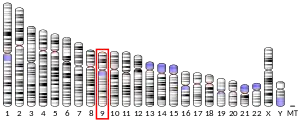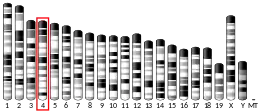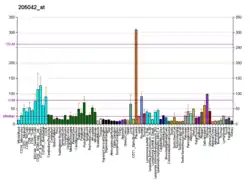GNE (gene)
Bifunctional UDP-N-acetylglucosamine 2-epimerase/N-acetylmannosamine kinase is an enzyme that in humans is encoded by the GNE gene.[5][6][7]
| GNE | |||||||||||||||||||||||||||||||||||||||||||||||||||
|---|---|---|---|---|---|---|---|---|---|---|---|---|---|---|---|---|---|---|---|---|---|---|---|---|---|---|---|---|---|---|---|---|---|---|---|---|---|---|---|---|---|---|---|---|---|---|---|---|---|---|---|
| |||||||||||||||||||||||||||||||||||||||||||||||||||
| Identifiers | |||||||||||||||||||||||||||||||||||||||||||||||||||
| Aliases | GNE, DMRV, GLCNE, IBM2, NM, Uae1, glucosamine (UDP-N-acetyl)-2-epimerase/N-acetylmannosamine kinase | ||||||||||||||||||||||||||||||||||||||||||||||||||
| External IDs | OMIM: 603824 MGI: 1354951 HomoloGene: 3996 GeneCards: GNE | ||||||||||||||||||||||||||||||||||||||||||||||||||
| |||||||||||||||||||||||||||||||||||||||||||||||||||
| |||||||||||||||||||||||||||||||||||||||||||||||||||
| |||||||||||||||||||||||||||||||||||||||||||||||||||
| |||||||||||||||||||||||||||||||||||||||||||||||||||
| |||||||||||||||||||||||||||||||||||||||||||||||||||
| Wikidata | |||||||||||||||||||||||||||||||||||||||||||||||||||
| |||||||||||||||||||||||||||||||||||||||||||||||||||
The bifunctional enzyme, UDP-N-acetylglucosamine 2-epimerase (UDP-GlcNAc 2-epimerase/N-acetylmannosamine kinase) regulates and initiates biosynthesis of N-acetylneuraminic acid (NeuAc), a precursor of sialic acids. UDP-GlcNAc 2-epimerase activity is rate-limiting for the biosynthesis of sialic acid and is required for sialylation in hematopoietic cells. The activity of the enzyme can be controlled at the transcriptional level and can affect the sialylation and function of specific cell surface molecules expressed on B cells and myeloid cells. Modification of cell surface molecules with sialic acid is crucial for their function in many biologic processes, including cell adhesion and signal transduction. Differential sialylation of cell surface molecules is also implicated in the tumorigenicity and metastatic behavior of malignant cells. Sialuria is a rare inborn error of metabolism characterized by cytoplasmic accumulation and increased urinary excretion of free NeuAc.[7]
References
- GRCh38: Ensembl release 89: ENSG00000159921 - Ensembl, May 2017
- GRCm38: Ensembl release 89: ENSMUSG00000028479 - Ensembl, May 2017
- "Human PubMed Reference:". National Center for Biotechnology Information, U.S. National Library of Medicine.
- "Mouse PubMed Reference:". National Center for Biotechnology Information, U.S. National Library of Medicine.
- Hinderlich S, Stasche R, Zeitler R, Reutter W (Oct 1997). "A bifunctional enzyme catalyzes the first two steps in N-acetylneuraminic acid biosynthesis of rat liver. Purification and characterization of UDP-N-acetylglucosamine 2-epimerase/N-acetylmannosamine kinase". J Biol Chem. 272 (39): 24313–8. doi:10.1074/jbc.272.39.24313. PMID 9305887.
- Stasche R, Hinderlich S, Weise C, Effertz K, Lucka L, Moormann P, Reutter W (Oct 1997). "A bifunctional enzyme catalyzes the first two steps in N-acetylneuraminic acid biosynthesis of rat liver. Molecular cloning and functional expression of UDP-N-acetyl-glucosamine 2-epimerase/N-acetylmannosamine kinase". J Biol Chem. 272 (39): 24319–24. doi:10.1074/jbc.272.39.24319. PMID 9305888.
- "Entrez Gene: GNE glucosamine (UDP-N-acetyl)-2-epimerase/N-acetylmannosamine kinase".
Further reading
- Wilcken B, Don N, Greenaway R, et al. (1987). "Sialuria: a second case". J. Inherit. Metab. Dis. 10 (2): 97–102. doi:10.1007/BF01800030. PMID 2443758. S2CID 35287967.
- Weiss P, Tietze F, Gahl WA, et al. (1989). "Identification of the metabolic defect in sialuria". J. Biol. Chem. 264 (30): 17635–6. doi:10.1016/S0021-9258(19)84615-X. PMID 2808337.
- Krasnewich DM, Tietze F, Krause W, et al. (1993). "Clinical and biochemical studies in an American child with sialuria". Biochem. Med. Metab. Biol. 49 (1): 90–6. doi:10.1006/bmmb.1993.1010. PMID 8439453.
- Mitrani-Rosenbaum S, Argov Z, Blumenfeld A, et al. (1996). "Hereditary inclusion body myopathy maps to chromosome 9p1-q1". Hum. Mol. Genet. 5 (1): 159–163. doi:10.1093/hmg/5.1.159. PMID 8789455.
- Bonaldo MF, Lennon G, Soares MB (1997). "Normalization and subtraction: two approaches to facilitate gene discovery". Genome Res. 6 (9): 791–806. doi:10.1101/gr.6.9.791. PMID 8889548.
- Seppala R, Lehto VP, Gahl WA (1999). "Mutations in the human UDP-N-acetylglucosamine 2-epimerase gene define the disease sialuria and the allosteric site of the enzyme". Am. J. Hum. Genet. 64 (6): 1563–9. doi:10.1086/302411. PMC 1377899. PMID 10330343.
- Keppler OT, Hinderlich S, Langner J, et al. (1999). "UDP-GlcNAc 2-epimerase: a regulator of cell surface sialylation". Science. 284 (5418): 1372–6. Bibcode:1999Sci...284.1372K. doi:10.1126/science.284.5418.1372. PMID 10334995.
- Ferreira H, Seppala R, Pinto R, et al. (1999). "Sialuria in a Portuguese girl: clinical, biochemical, and molecular characteristics". Mol. Genet. Metab. 67 (2): 131–7. doi:10.1006/mgme.1999.2852. PMID 10356312.
- Lucka L, Krause M, Danker K, et al. (1999). "Primary structure and expression analysis of human UDP-N-acetyl-glucosamine-2-epimerase/N-acetylmannosamine kinase, the bifunctional enzyme in neuraminic acid biosynthesis". FEBS Lett. 454 (3): 341–4. doi:10.1016/S0014-5793(99)00837-6. PMID 10431835. S2CID 31863212.
- Leroy JG, Seppala R, Huizing M, et al. (2001). "Dominant inheritance of sialuria, an inborn error of feedback inhibition". Am. J. Hum. Genet. 68 (6): 1419–27. doi:10.1086/320598. PMC 1226128. PMID 11326336.
- Eisenberg I, Avidan N, Potikha T, et al. (2001). "The UDP-N-acetylglucosamine 2-epimerase/N-acetylmannosamine kinase gene is mutated in recessive hereditary inclusion body myopathy". Nat. Genet. 29 (1): 83–7. doi:10.1038/ng718. PMID 11528398. S2CID 9941510.
- Kovach MJ, Waggoner B, Leal SM, et al. (2002). "Clinical delineation and localization to chromosome 9p13.3-p12 of a unique dominant disorder in four families: hereditary inclusion body myopathy, Paget disease of bone, and frontotemporal dementia". Mol. Genet. Metab. 74 (4): 458–75. doi:10.1006/mgme.2001.3256. PMC 6277059. PMID 11749051.
- Kayashima T, Matsuo H, Satoh A, et al. (2002). "Nonaka myopathy is caused by mutations in the UDP-N-acetylglucosamine-2-epimerase/N-acetylmannosamine kinase gene (GNE)". J. Hum. Genet. 47 (2): 77–9. doi:10.1007/s100380200004. PMID 11916006.
- Tomimitsu H, Ishikawa K, Shimizu J, et al. (2002). "Distal myopathy with rimmed vacuoles: novel mutations in the GNE gene". Neurology. 59 (3): 451–4. doi:10.1212/wnl.59.3.451. PMID 12177386. S2CID 38623700.
- Arai A, Tanaka K, Ikeuchi T, et al. (2002). "A novel mutation in the GNE gene and a linkage disequilibrium in Japanese pedigrees". Ann. Neurol. 52 (4): 516–9. doi:10.1002/ana.10341. PMID 12325084. S2CID 23825084.
- Darvish D, Vahedifar P, Huo Y (2003). "Four novel mutations associated with autosomal recessive inclusion body myopathy (MIM: 600737)". Mol. Genet. Metab. 77 (3): 252–6. doi:10.1016/S1096-7192(02)00141-5. PMID 12409274.
- Nishino I, Noguchi S, Murayama K, et al. (2003). "Distal myopathy with rimmed vacuoles is allelic to hereditary inclusion body myopathy". Neurology. 59 (11): 1689–93. doi:10.1212/01.wnl.0000041631.28557.c6. PMID 12473753. S2CID 45523943.
- Vasconcelos OM, Raju R, Dalakas MC (2003). "GNE mutations in an American family with quadriceps-sparing IBM and lack of mutations in s-IBM". Neurology. 59 (11): 1776–9. doi:10.1212/01.wnl.0000039780.13681.ad. PMID 12473769. S2CID 42238112.
External links
- GNE human gene location in the UCSC Genome Browser.
- GNE human gene details in the UCSC Genome Browser.
- GeneReviews/NCBI/NIH/UW entry on Sialuria




